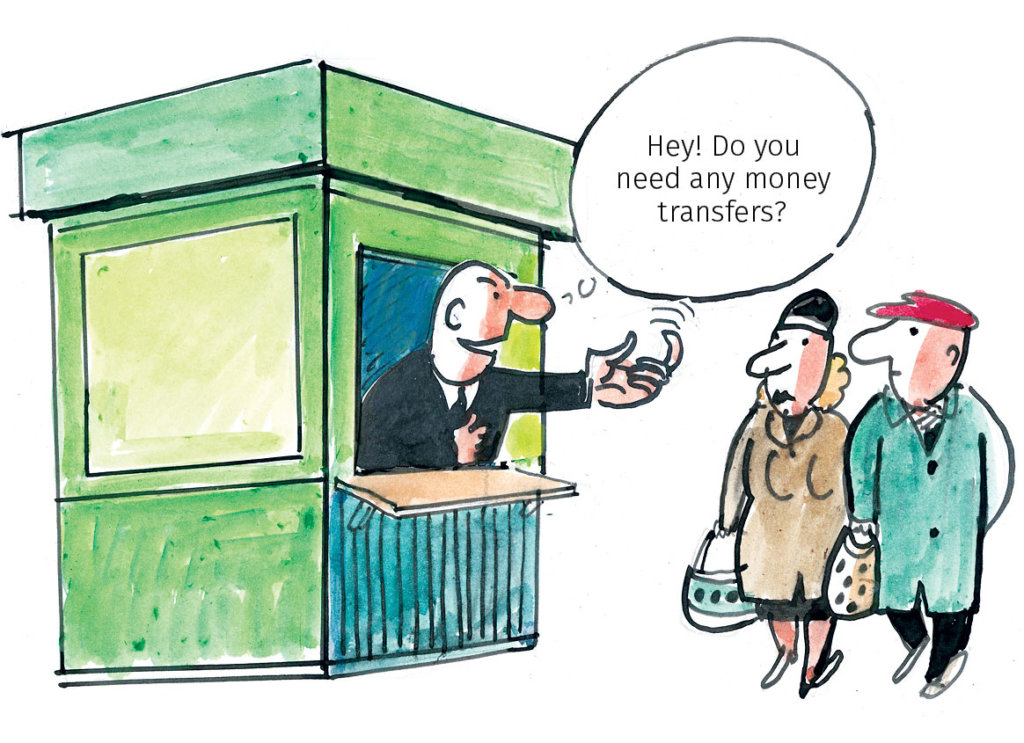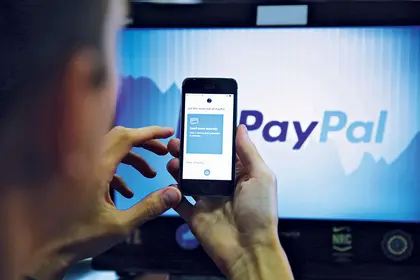Ukrainian entrepreneur Petro Golota sells handmade woolen shoes online, on such U.S. marketplaces as Etsy and eBay. Both websites support only one payment system — PayPal.
It is a convenient internet-based money transfer service popular in the West. But PayPal doesn’t work in Ukraine. While Ukrainians can use the service to send funds to other PayPal users, they can’t receive money.
JOIN US ON TELEGRAM
Follow our coverage of the war on the @Kyivpost_official.
So Golota and thousands of other local small entrepreneurs have to be creative to find a way to earn their living by selling their handicraft via virtual marketplaces like Amazon, eBay, Etsy, Craftsy, Ravelry, and many others, where PayPal may be the only payment option.
- Find the most current war in ukraine update in the Kyiv Post’s daily news reports published today.
- Access the latest Ukraine news coverage for today.
Shady intermediaries
For more than two years, craftsman Golota’s business has relied on a shady but convenient go-between.
The intermediary, called Western Bid, has its own PayPal account in the United States; it receives money that Golota earns on eBay and Etsy, charges a 5 percent commission, and sends the rest of the money to Golota’s Ukrainian bank.
“It’s easy to work with them,” Golota told the Kyiv Post. “Almost legally.”
Western Bid adamantly refused to talk with the Kyiv Post. Its CEO Michael Birman said doesn’t want public attention from English-speaking communities.
Another go-between popular with Ukrainian freelancers, Seller-Online, was also shy about its operations and services. “We would (talk to you) if you were our client,” the operator said, several times refusing to give his name.
Law firm ePravo co-founder Vitalii Vlasiuk said such a reaction could mean that both enterprises are working in the “gray zone” abroad — their operations are not regulated by current laws, but they’re trying to keep a low profile.
Both Etsy and eBay refused to talk with the Kyiv Post about these firms as well.
Even though Ukraine’s freelancer community admits such intermediaries are indeed dodgy, many small entrepreneurs, including Golota, are happy they exist — there’s simply no other easy option for them.
Foreign banks
There are other ways to get around the lack of full PayPal service in Ukraine.
PayPal is widely used not because its service is unique, but simply because this company has come to dominate the global market for electronic payments.
And so Ukrainian Julia Kyryluck — even though she sells translation services, manages social media and does not work with marketplaces at all — has to use PayPal sometimes. Her customers “do not always want, or cannot” use alternatives to the service, she said.
“And no argument can convince them,” she told the Kyiv Post. “They say, ‘I got used to it and that’s all.'”
The problem made Kyryluck go a long way to find a solution — literally: When she went to Thailand on a travel visa, she approached 10 local banks to open an account there. Many refused because she was not visiting the country for business reasons, but one agreed.
Now, back in Ukraine, she works remotely, receives payments to her Thai PayPal account, transfers the money to the Thai bank linked to it (this takes two weeks), and then — sends the money to Ukraine through services like MoneyGram or Western Union.
These money transfer services carried out transactions worth over $9 billion in 2017, according to the National Bank of Ukraine, the country’s central bank.
A lot of Ukrainian freelancers exploit schemes similar to Kyryluck’s. Some have studied or worked abroad and kept their foreign bank account; when PayPal asks such users to provide proof that the person still lives abroad, some give up their account, while others resort to photoshopping utility bills with a foreign address.
Others have friends abroad who are willing to let them use their PayPal accounts.
Kyryluck’s Thai bank card expires in 2020. She will have to go back to Thailand and ask it to reissue the card. Otherwise, she said she might go to Columbia or Panama, where she heard banks require even fewer documents to open an account.

Tallinn option
After Estonia, a Baltic country of 1.3 million people, introduced e-residency in 2014 — which allows non-Estonians to get access to Estonian services such as company formation, banking, and payment processing — Ukrainians gained another way to get hold of a full-fledged PayPal account.
However, this way is not hugely popular, as entrepreneurs in Estonia have to pay 20 percent in taxes, whereas the tax in Ukraine is just 5 percent. Only 2,500 Ukrainians have Estonian e-residency.
Online invoicing
For Denis Belozorov, a freelance computer system repairman, it’s a lottery receiving money from abroad — sometimes it’s easy, sometimes not.
Most of the time after fixing someone’s problems with computer software in the United States, Canada, the European Union, or anywhere else, Belozorov sends an invoice.
He uses the Portmone or iPay services, which create a web page that looks like a typical internet acquiring page — with a sum and boxes for bank card details; the sort of page one would see purchasing something in an online store. The services charge 2.5–3 percent of the sum transferred.
This is convenient for Belozorov in general, but from time to time customers don’t want to use the unknown service, or worse — foreign banks can block the transfer, having determined the payment to Ukraine to be suspicious. In the latter case, customers have to call the bank and confirm the payment over the phone.
Belozorov says that occasionally a customer’s bank card is old and doesn’t support 3-D Secure, a system that asks the user to type in a password linked to the bank card. If so, nothing can be done, because Ukrainian banks only accept transactions verified by password.
Given all these inconveniences, customers might decide to use the services of Belozorov’s competitors.
“My individual payments are small, so I need as many clients as possible,” he told the Kyiv Post. “I would happily work via PayPal and transfer the money to my entrepreneur bank account… as people do in civilized countries.”
PayPal and Ukraine
PayPal can be used in more than 200 countries, while the send-only strategy is used in almost half of them, including Ukraine.
Galina Skatkina, the head of communications for PayPal Russia and Central and Eastern Europe, told the Kyiv Post that “Ukraine is an important market for PayPal” and that the company aims to help local consumers fully benefit from what global e-commerce has to offer.”
However, Skatkina sees no prospect of PayPal rolling out any new functionality in Ukraine any time soon.
“Currently we have no news to announce regarding turning on Receive functionality in Ukraine,” she said. “But send-only functionality doesn’t mean that we take our obligations to our customers in Ukraine lightly, nor does it mean this market is excluded from our most important global, consumer updates.”
In another more formal reply from PayPal customer support, the company says that when offering its service in a country, the company “needs to ensure that it is compliant with both local and international laws” before launching its full service.
The National Bank of Ukraine, in turn, claims that it has “taken a range of steps to ensure Ukrainians can have access to international payment systems” and that companies like PayPal can work in Ukraine with no legal constraints.
“The NBU has a positive position towards all internet payment systems that provide services in Ukraine or seek to enter our market, provided that they comply with the Ukrainian legislation,” an NBU spokesperson told the Kyiv Post.
Meanwhile, Golota the shoemaker has to work with shady companies; translator Kyrylchuk looks for countries that have lax laws allowing banks to open a bank account for those in the country on a travel visa; and computer repairman Belozorov just has to hope that the next transaction from a customer will go smoothly.
The Kyiv Post’s technology coverage is sponsored by Ciklum and NIX Solutions. The content is independent of the donors.
You can also highlight the text and press Ctrl + Enter




